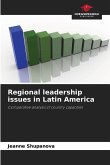When do rising powers fail to establish legitimate regional leadership and instead face contestation by their regional challengers? This book investigates how and why the BRICS (Brazil, Russia, India, China, and South Africa) project leadership in South America, post-Soviet Eurasia, South and Southeast Asia, and sub-Saharan Africa, respectively, and in what ways their main regional challengers respond. Based on a systematic conceptualization of the types and drivers of leadership and contestation, the authors assess the impact of the rise of regional powers on weaker states' security, sovereignty, and status, as well as the consequences of contestation for regional economic development and stability and the regional powers' bid for greater voice in global governance. By illuminating the sources and effects of power politics in five regions that are increasingly pivotal for the emerging world order, the volume offers a global comparative analysis of contemporary regional contestedleadership that will interest scholars and students of international affairs, foreign policy, and area studies.
Bitte wählen Sie Ihr Anliegen aus.
Rechnungen
Retourenschein anfordern
Bestellstatus
Storno








